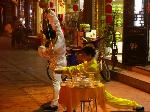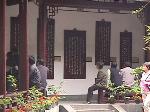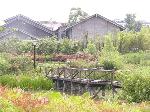- Getting around Lijiang. Dont stay in the Old Towns more than 2 days, there is nothing to do. KRISS Oct 9, 2013 05:46
- 2013 Beijing Temple Fair BENNYLAU Feb 26, 2013 03:29
- Malaysian traveling from KUL - LAX vis Shanghai PVG ZATI_DY Jan 3, 2013 20:15
Pleasures of the Leaf
- Views: 3433
- |Vote: 0 0
- |Add to Favorites
- |Recommend to Friends
The Green Muse
Maybe I’m too much the romantic, but of all the cities in China that I’d been dying to visit since I first got here, right at the top of my list was Chengdu, and it was all because of the tea.
Not because of the quality of the tea – there are other places in China famous for tea production – but because of the frequency with which it’s drunk. All day, every day, in sweet little tea houses all across the city. Or so the legend goes.
This account of Chengdu’s daily lifestyle appealed to me immensely, perhaps because it was a habit I could understand. I’d wasted many hours of my Arts degree dubiously musing over latte coffees in Auckland cafes, pondering my philosophy and literature courses. I’d been captivated, at the time, by the fact that the famous French philosopher Jean-Paul Sartre had written the greater part of his most brilliant works sitting at a cafe, passing his time watching the crowds wander by. It sounded far more attractive than sitting in the library, and I rather fancied that life was meant to be enjoyed this way, refilling the glass, leaning back, watching and thinking and smiling under the mild stimulating influence of the caffeine. From what I had read of Chengdu, it seemed that people there shared my view.
The one thing I’ve always liked about China is that they respect people who like to take it easy and think things over. In a town like Chengdu, I’d heard, this kind of intellectual laziness was not just accepted, it was simply part of daily life – if you wanted to do anything, you’d better start with a strong, hot cup of green tea, and sit there as the fresh fragrance washed about you and your companions as you thought, chatted, played and enjoyed life for its simpler, more sedate pleasures.
Chengdu has been that way for centuries, and it’s probably something to do with its remoteness - both geographically and politically. Always too far away to be of great concern to whoever was in power at the time, Chengdu gradually became a lazy and colourful haven of culture – distinct musical traditions formed here, underground poetry movements, artistic revolutions – the kind of inspiration that breeds in tea houses – impassioned intellectuals locking their creative horns over the teapot. I loved the idea, and wanted to see for myself if Chengdu really was as much of a hotpot for brain waves as it is for its famous chillies.
The Traffic
Chengdu, when I finally arrived, was just as charming as I’d hoped – but this was something I put down to the hour of my arrival more than anything else. I’d arrived way past midnight on a famously slow and bumpy bus ride from Chongqing – those roads that hug the mountainous slopes of eastern Sichuan are hard to take at any time of the day. When I crawled down to the ground at last in the warm Sichuan air, I just wanted to get some balance back and decided to ignore the earnest taxi drivers and just walk out into the city. Besides, I was delighted to be in Chengdu at last, and fancied I could feel the poetry already like a kind of electrical static – either that or the scent of warm tea wafting across the suburbs.
What struck me immediately was the amount of people outside. Just as I'd been led to believe, there they all were, huddled around tables of steaming tea and spicy hot meals, waggling their fingers excitedly as they pressed their points home. I'd like to have imagined that they were discussing their different interpretations of Chinese classic novels, although it was far more likely that they were just gossiping and arguing as groups over dinner do all across the country, and the world. By the time I joined in, sitting down to get something to eat myself, it was already three in the morning and the street restaurants were showing no signs of closing: neither were the customers interested in going home to bed.
Perhaps this wasn't quite what I'd imagined - I was really thinking bamboo-decorated tea lofts with mezzanine terraces - but even so, the unhurriedness and warmth of the Chengduites enamoured me immediately to the city, and it was with some reluctance that I had to admit my own weariness. I gathered my remaining energies and headed for the infamous Traffic Hotel in the south of Chengdu.
The Traffic has become something of an institution for public backpackers in Chengdu, quite simply because it’s one of the only places that’s been regularly reviewed in the international guidebooks – the Lonely Planet, the Rough Guide, and so on. It’s not the only budget hotel in the area, or even the best – I went on to meet a rather put-out hotelier claiming he ran a better hostel, who had resorted to plucking foreigners from arriving trains to beg them to reconsider their accommodation plans – but if you read almost any account of an adventurer who has passed through Chengdu, you’ll probably find that he or she stayed at the Traffic, and furthermore that he or she enjoyed their banana pancakes for breakfast above all else on the menu.
It’s unassuming enough, and kind’ve hard to find in its packed-away side-street location by the river – but it is cheap. I managed to find a bed for 40 a night – and my first ‘night’ was free, seeing as I’d arrived so late – and the deal includes a ticket that I could exchange for my chosen breakfast – banana pancakes of course – when I got around to waking up.
The Bard's Thatch Hut
Chengdu had rather transformed in the daylight, and I received quite a shock when I got my hands on a copy of the map. Chengdu, in the simplifying pastels of the road diagram, looked disturbingly like Beijing. The same ring roads, the same inconspicuous little river winding its way through the suburbs. When I headed outdoors, the resemblance was even more pronounced. I got on a bus and began shaking my head – it couldn’t be true. Under the same near-white sunlight that I have come to associate with the capital, the same kinds of featureless rectangular office blocks lined the regular, parallel streets. Locals in the daytime, I noticed, were wandering about industriously, just as I have seen them do in every provincial capital I have visited – not relaxing over pots of tea at all.
Chengdu has changed, after all, from the distant little cultural town that it used to be. Sichuan province’s population keeps on increasing, and with the dividing off of the Chongqing metropolitan area from the rest of the province, Chengdu has become more and more important over recent decades. Money has begun to flow through the hands of the citizens of the city of poetry, and it’s made its mark.
Appropriately enough, it was Chengdu’s shrine to poetry that was what I was most interested in seeing. Chengdu is the sometime home of one of China’s most illustrious bards – the celebrated Du Fu. Although he wasn’t actually born in Chengdu, he did write there and at the Du Fu Cottage, a replica of his house stands in a park devoted to his works, with many of his finest poems on display. The bus took me to Qinghua Road, and I began to stroll through the park along the quiet Huanhua stream flowing through the park, full of brightly coloured goldfish that swarmed around anyone who happened to be throwing bread into the water in astonishing numbers.
Just as I had hoped, the poetry appreciation areas were filled with locals just passing the time and admiring the verse. I had begun to fear that Chengdu had been entirely won over to commercialisation – but no, just as I’d seen the night before, there were still plenty of people taking time out for a little culture. The Du Fu cottage itself was sweet, and although much less authentic than I’d hoped, the whole atmosphere was one of respect.
Looking at the map, I realised there were far more attractions in Chengdu than I could possibly hope to fit in over my short stay. Not far away from the Du Fu cottage is a splendid temple to Daoism – more of a philosophy than a religion - and I was much rewarded my making the walk over and taking a look – particularly in that it allowed me to explore some of the old Chengdu Hutongs which rival Beijing’s in their labyrinthine complexity. The Qingyang Temple was beautiful, but I found that after I’d walked through the prayer halls and past the incense pots, I gained the most pleasure by sitting outside the temple with the locals on little tables, watching them chat. In the distance, I spotted one of the tea houses I’d read about – seemingly more of a novelty, touristy item these days – but it was packed with people enjoying the pleasures of the leaf.
Chengdu reminded me of Beijing much more than I had expected it would – and it’s certainly no longer the city of the romantic poets – or at least if it is, then it’s no longer as obvious as it once was. Chengdu is just as bustling and busy as any city struggling to become affluent can be, but the roots in culture are still deep, and can be felt even still.






 Copyright © 1998-2026 All rights reserved.
Copyright © 1998-2026 All rights reserved.